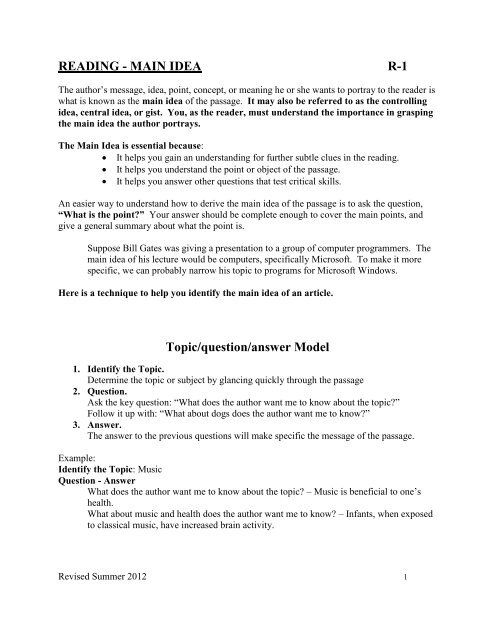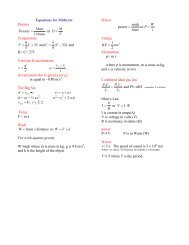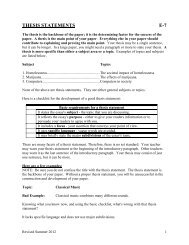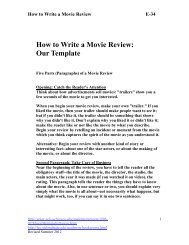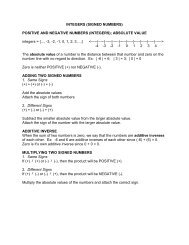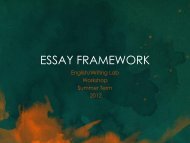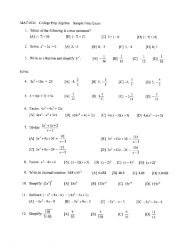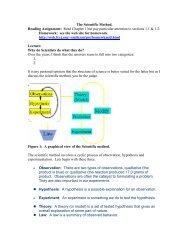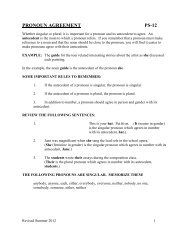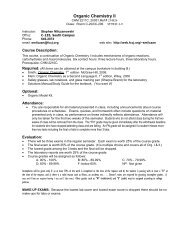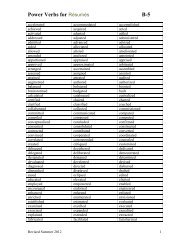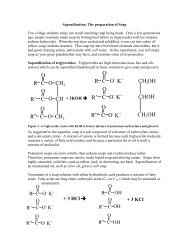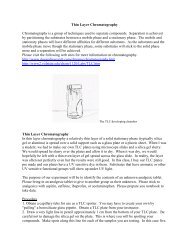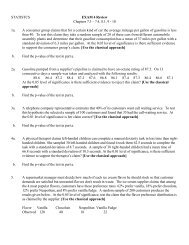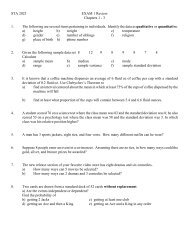reading - main idea r-1
reading - main idea r-1
reading - main idea r-1
- No tags were found...
Create successful ePaper yourself
Turn your PDF publications into a flip-book with our unique Google optimized e-Paper software.
READING - MAIN IDEA R-1The author’s message, <strong>idea</strong>, point, concept, or meaning he or she wants to portray to the reader iswhat is known as the <strong>main</strong> <strong>idea</strong> of the passage. It may also be referred to as the controlling<strong>idea</strong>, central <strong>idea</strong>, or gist. You, as the reader, must understand the importance in graspingthe <strong>main</strong> <strong>idea</strong> the author portrays.The Main Idea is essential because: It helps you gain an understanding for further subtle clues in the <strong>reading</strong>. It helps you understand the point or object of the passage. It helps you answer other questions that test critical skills.An easier way to understand how to derive the <strong>main</strong> <strong>idea</strong> of the passage is to ask the question,“What is the point?” Your answer should be complete enough to cover the <strong>main</strong> points, andgive a general summary about what the point is.Suppose Bill Gates was giving a presentation to a group of computer programmers. The<strong>main</strong> <strong>idea</strong> of his lecture would be computers, specifically Microsoft. To make it morespecific, we can probably narrow his topic to programs for Microsoft Windows.Here is a technique to help you identify the <strong>main</strong> <strong>idea</strong> of an article.Topic/question/answer Model1. Identify the Topic.Determine the topic or subject by glancing quickly through the passage2. Question.Ask the key question: “What does the author want me to know about the topic?”Follow it up with: “What about dogs does the author want me to know?”3. Answer.The answer to the previous questions will make specific the message of the passage.Example:Identify the Topic: MusicQuestion - AnswerWhat does the author want me to know about the topic? – Music is beneficial to one’shealth.What about music and health does the author want me to know? – Infants, when exposedto classical music, have increased brain activity.Revised Summer 2012 1
READING - MAIN IDEA R-1Journalistic ModelThe journalistic model goes back to the primitive Who, What, When, Where, Why, and Howquestions. The basic, most important questions that must be answered areWho – identifies the subject (people, places or things).What – represents the verb (what action is being expressed).The rest of the questions may not be necessary to identify the <strong>main</strong> <strong>idea</strong>.Two types of Main IdeasStated Main IdeaA stated <strong>main</strong> <strong>idea</strong> is bluntly expressed in a sentence or two. It is either in the passage orindividual paragraphs. They are usually, but not necessarily, located in the first or lastsentence.Implied Main IdeaImplied <strong>main</strong> <strong>idea</strong> cannot be immediately pointed out by skimming the passage.SummaryThe <strong>main</strong> <strong>idea</strong> of a passage or paragraph is the basic message, the gist, or the centralor controlling <strong>idea</strong> the author tries to convey.The two types of <strong>main</strong> <strong>idea</strong> are stated and implied. Stated is expressed very openly;implied is derived from various places in the text.Once you know the author’s <strong>main</strong> point, you will be prepared to understand othercritical skills necessary to pass the CLAST.HintsRead all your choices. This will enable you to avoid picking an answer that is notspecific over an answer that properly delivers the author’s <strong>main</strong> <strong>idea</strong>.Watch out for too general or too specific answers.The correct answer can paraphrase the stated <strong>main</strong> <strong>idea</strong> of the phrase.Read actively! The <strong>main</strong> <strong>idea</strong> may seem prominent within the paragraph or phrase,but specific details can give way to a better answer.The following will help you prepare for the CLAST test before taking it.Revised Summer 2012 2
READING - MAIN IDEA R-1The Instructions will be: Read the following passage. Then choose the best answer for eachitem.Format to the questions: Which statement best expresses the central <strong>idea</strong> of this passage? The <strong>main</strong> <strong>idea</strong> expressed in this passage is… The most accurate expression of the central or controlling <strong>idea</strong> of this passage is…Answer format: Correct option Incorrect optionso a misinterpretation of the <strong>main</strong> <strong>idea</strong>o a misinterpretation of supporting detailso a misinterpretation of an <strong>idea</strong> other than the <strong>main</strong> <strong>idea</strong>o a statement directing the reader to a supporting <strong>idea</strong> instead of <strong>main</strong> <strong>idea</strong>o a statement that directs the reader to an <strong>idea</strong> with external non-relevant detailso an incomplete statementExample:Animals benefit human beings in many reasons. Direction, companionship, and security are afew reasons people have pets. A study at one prison showed that owning a pet can change ahardened prison inmate into a more caring person. Lonely individuals have purpose in their livesafter developing a relationship with a cat, dog, or fish. Children interact with their pets on abasis that very few understand. Animals, then, can be viewed as beneficial to human beings.Analysis:WHO:WHAT:WHERE:WHEN:WHY:HOW:Animalsare beneficialDirection, companionship, and securityORTOPIC: Animals and humansQUESTIONS: What about animals and humans?ANSWER: Animals are beneficial to human survival.Revised Summer 2012 3
READING - MAIN IDEA R-1Now it is time to test your skills:Directions: Read the following passage, and then choose the best answer for each item.Coffee is a universal beverage that is served in different ways around the world. In London, forexample, some Englishmen dip mustard into their coffee, while in Denver, a person might add adash of ketchup. Strips of orange and lemon peel, cloves and cinnamon sticks are not unusualadditions to the brew in Europe. An Asian delight consists of coffee brewed in boiling sugar.Perhaps the richest cup of coffee can be enjoyed in Ireland where whiskey and whipped creamare important ingredients. In Australia, a waitress will ask, “Do you want black or white?”Black is plain black coffee, but white is half coffee and half warm milk. If an Australian ordersiced coffee, he will be served a cup of steaming coffee with a scoop of ice cream. It sounds likethe Australian version of a “snowball in hell.”1. Which statement best expresses the <strong>main</strong> <strong>idea</strong>?a. The richest cup of coffee can be enjoyed in Ireland.b. Asians enjoy a sweet cup of coffee.c. Coffee is enjoyed in a variety of ways.d. Australians have an unusual sense of humor.2. The paragraph suggest that coffee can bea. Expensiveb. Rarec. Commond. Exciting3. The paragraph could be entitleda. Some like it hot.b. Coffee around the World.c. Oriental Delights.d. A Snowball in Hell.The Thames River stank. The air was filled with a “disease odor,” as Londoners called it, andsoot clung to ladies’ dresses. London grew so polluted that, by royal decree, the use of sea-coalwas forbidden. The government went so far as to empower a council to prosecute those who didnot obey the ban. The council handed out fines for the first offense, and destroyed furnaces afterRevised Summer 2012 4
READING - MAIN IDEA R-1the second. It is believed that at least one lawbreaker was put to death for “fouling His Majesty’sair.” Clearly, London law officials in the 1300’s were concerned about pollution.4. Based on the information supplied in the paragraph, which sentence expresses the <strong>main</strong><strong>idea</strong>?a. Disease was common in London during the 1300’s.b. English courts were harsh and unjust.c. Fourteenth century Londoners were poor and abused.d. Pollution was a serious problem in fourteenth century London.5. The government banned the burning of sea-coal because ita. spread disease among the people.b. was scarce and of poor quality.c. caused pollution and bothered people.d. was expensive and unsafe for use in homes.6. A major point of the paragraph is thata. concern about pollution is not new.b. pollution can cause serious problems.c. some people always disobey the law.d. governments should control fuel consumption.7. What is the sentence or sentence’s which expresses the <strong>main</strong> <strong>idea</strong>.________________________________________________________________________In the words of Thomas DeQuincey, “It is notorious that the memory strengthens as you layburdens upon it.” If, like most people, you have trouble recalling the names of those you havejust met, try this: the next time you are introduced, plan to remember the names. Say to yourself,“I’ll listen carefully; I’ll repeat each person’s name to be sure I’ve got it; and I will remember.”You’ll discover how effective this technique is and probably recall those names for the rest ofyour life.8. The <strong>main</strong> <strong>idea</strong> of the paragraph <strong>main</strong>tains that the memorya. always operates at peak efficiency.b. breaks down under great strain.c. improves if it is used often.d. becomes unreliable if it tires.Revised Summer 2012 5
READING - MAIN IDEA R-19. Thomas DeQuincey believed that the memory can be improved. He most probablywould have agreed with which of these statements?a. Most people fail to make full use of their memory.b. Memory training is difficult.c. Remembering names is taxing.d. A few people have good memories, but most people do not.10. The author develops his <strong>main</strong> <strong>idea</strong> bya. comparing memory training to other forms of training.b. arguing with noted authorities.c. challenging Thomas DeQuincey.d. explaining a technique useful in memory training.11. What is the topic sentence(s) of the paragraph?________________________________________________________________________Check your answers at the back of the packet. If you need more help, feel free to consult aCommunications Lab employee.Revised Summer 2012 6
READING - MAIN IDEA R-1Answers1. C2. D3. B4. D5. C6. A7. Clearly, London law officials in the 1300’s were concerned about pollution.8. C9. A10. D11. In the words of Thomas DeQuincey, “It is notorious that the memory strengthens as youlay burdens upon it.”Revised Summer 2012 7


